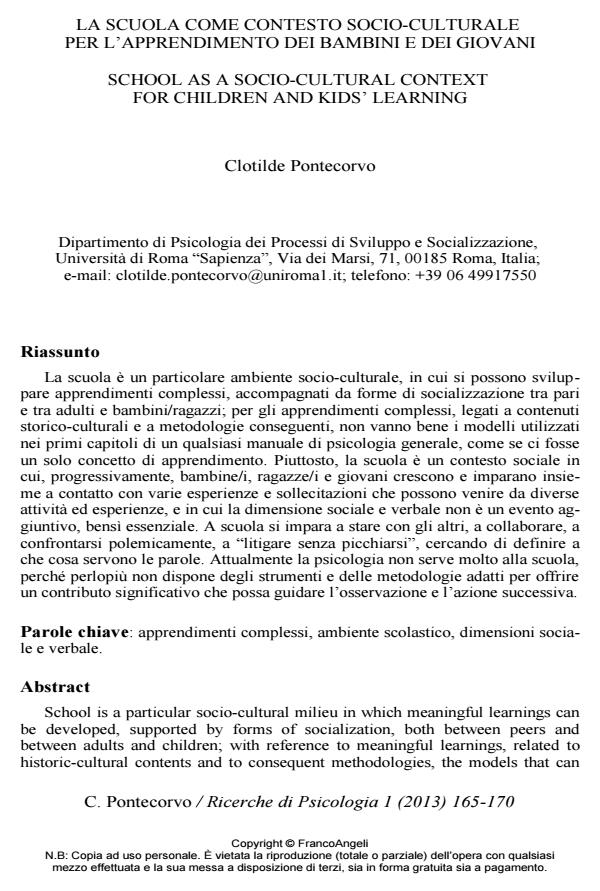School as a socio-cultural context for children and kids’ learning
Journal title RICERCHE DI PSICOLOGIA
Author/s Clotilde Pontecorvo
Publishing Year 2013 Issue 2013/1
Language Italian Pages 6 P. 175-170 File size 163 KB
DOI 10.3280/RIP2013-01012
DOI is like a bar code for intellectual property: to have more infomation
click here
Below, you can see the article first page
If you want to buy this article in PDF format, you can do it, following the instructions to buy download credits

FrancoAngeli is member of Publishers International Linking Association, Inc (PILA), a not-for-profit association which run the CrossRef service enabling links to and from online scholarly content.
School is a particular socio-cultural milieu in which meaningful learnings can be developed, supported by forms of socialization, both between peers and between adults and children; with reference to meaningful learnings, related to historic-cultural contents and to consequent methodologies, the models that can be found in the first chapters of any Psychology handbook are not adequate, as if there was a unique concept of learning. School is rather a social context in which, gradually, children and kids grow up and learn together through experiences and proposals that may come from different activities, and in which the social and verbal dimension is not an added event but fundamental. At school young people learn to stay with others, to cooperate, to face each other, to "argue without beating each other", trying to define what words are used for. Psychology is currently ineffective to solve learning problems because it is not largely able to arrange tools and methodologies which are suitable to offer a meaningful contribution that may guide observation and educational action.
Keywords: Meanigful learnings, school, social and verbal dimensions
- Cole, M. (1996). Cultural Psychology. A once and future discipline. Harvard University Press (trad. it. Psicologia culturale. Una disciplina del passato e del futuro. Roma: Carlo Amore, 1996).
- Collins, A., Seely Brown, J., & Newman S.E. (1995). L’apprendistato cognitivo. In C. Pontecorvo, A.M. Ajello, & C. Zucchermaglio (Eds.), I contesti sociali dell’apprendimento. Acquisire conoscenze a scuola, nel lavoro, nella vita quotidiana. (pp.181-231). Milano: LED.
- Hood, L., Fiess, K., & Aron, J. (1988). Crescere ‘spiegati’: uno sguardo da vygotskiani al linguaggio della causalita. Eta Evolutiva, 41, pp. 5-26.
- Melazzini, C. (2011). Insegnare al Principe di Danimarca. Palermo: Sellerio.
- Pontecorvo, C. (1999). Manuale di psicologia dell’educazione. Bologna: il Mulino.
- Pontecorvo, C., Ajello, A.M., & Zucchermaglio, C. (1995). I contesti sociali dell’apprendimento. Acquisire conoscenze a scuola, nel lavoro, nella vita quotidiana. Milano: LED.
- Ritscher, P., & Staccioli, G. (2011). Slow school. Pedagogia del quotidiano. Firenze: Giunti.
- Stili educativi genitoriali, benessere scolastico e rendimento scolastico in adolescenza Maria Giulia Olivari, Eleonora Mascheroni, Gaia Cuccì, Emanuela Confalonieri, in RICERCHE DI PSICOLOGIA 1/2019 pp.9
DOI: 10.3280/RIP2019-001001
Clotilde Pontecorvo, La scuola come contesto socio-culturale per l’apprendimento dei bambini e dei giovani in "RICERCHE DI PSICOLOGIA " 1/2013, pp 175-170, DOI: 10.3280/RIP2013-01012